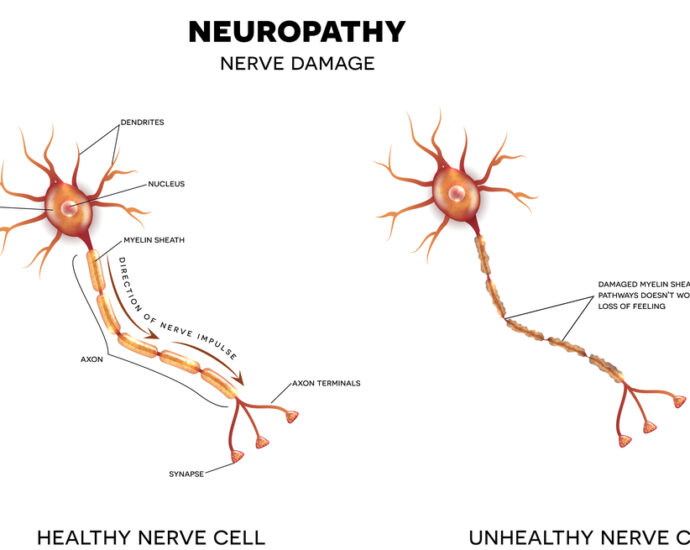If you’ve ever experienced burning, tingling, numbness, or shooting pain in your hands or feet, you might be dealing with neuropathy—a condition that affects millions of people worldwide. Neuropathy, also known as peripheral neuropathy, involves damage to the peripheral nerves that connect the brain and spinal cord to the rest of the body.
Whether caused by diabetes, injury, infection, or unknown factors, neuropathy can significantly impact quality of life. This article will explore what neuropathy is, what causes it, the most common symptoms, and effective treatment options, both conventional and natural.
Page Contents
What Is Neuropathy?
Neuropathy is a broad term that refers to nerve damage or dysfunction outside the brain and spinal cord. The peripheral nervous system includes:
- Sensory nerves (control sensation)
- Motor nerves (control muscle movement)
- Autonomic nerves (regulate involuntary functions like heart rate and digestion)
When these nerves are damaged, they can send faulty signals—or fail to send signals altogether—leading to pain, weakness, or other issues in the body.
Types of Neuropathy
Neuropathy is categorized based on the nerves affected:
- Peripheral neuropathy: Affects the hands, feet, arms, and legs (most common)
- Cranial neuropathy: Affects the cranial nerves (e.g., Bell’s palsy)
- Autonomic neuropathy: Affects nerves that control internal organs
- Focal neuropathy: Affects a single nerve or group of nerves, often suddenly
Common Causes of Neuropathy
There are dozens of potential causes, but some of the most common include:
- Diabetes: High blood sugar levels damage nerve fibers over time. Diabetic neuropathy affects up to 50% of people with diabetes.
- Injury or trauma: Accidents, surgeries, or repetitive stress can compress or sever nerves.
- Infections: Shingles, Lyme disease, hepatitis C, and HIV can lead to nerve damage.
- Autoimmune diseases: Lupus, rheumatoid arthritis, and Guillain-Barré syndrome can attack nerve tissue.
- Nutrient deficiencies: Lack of B vitamins, especially B1, B6, and B12, can harm nerves.
- Alcohol abuse: Chronic alcohol consumption leads to nutritional deficiencies and nerve toxicity.
- Toxins and medications: Chemotherapy drugs, heavy metals, and certain antibiotics may contribute.
- Idiopathic neuropathy: In some cases, the cause is unknown.
Neuropathy Symptoms
Symptoms vary depending on the type of nerve(s) affected but often include:
Sensory Nerve Symptoms:
- Tingling or “pins and needles”
- Numbness, especially in hands or feet
- Burning or stabbing pain
- Sensitivity to touch or temperature
Motor Nerve Symptoms:
- Muscle weakness
- Twitching or cramping
- Loss of coordination or balance
- Paralysis in severe cases
Autonomic Nerve Symptoms:
- Dizziness or fainting
- Digestive problems (nausea, constipation)
- Bladder dysfunction
- Abnormal heart rate or blood pressure
These symptoms may be constant or come and go, and they typically begin in the extremities (feet and hands) before progressing upward.
Diagnosing Neuropathy
Your healthcare provider may use a combination of:
- Medical history and symptom review
- Neurological exams (testing reflexes, muscle strength, sensation)
- Electromyography (EMG) and nerve conduction studies
- Blood tests (to check for vitamin deficiencies, diabetes, or autoimmune issues)
- Imaging (MRI or CT scans to rule out structural causes)
Early diagnosis is crucial to slow progression and prevent permanent nerve damage.
Treatment Options for Neuropathy
There is no universal cure, but treatment focuses on managing symptoms, slowing progression, and addressing underlying causes.
Medical Treatments
- Medications: Pain relievers, anti-seizure drugs (gabapentin, pregabalin), and antidepressants (amitriptyline, duloxetine) are often used for nerve pain.
- Topical treatments: Capsaicin cream or lidocaine patches can help localized pain.
- Treatment of underlying conditions: Managing blood sugar, correcting vitamin deficiencies, or treating autoimmune disorders can prevent further nerve damage.
Lifestyle and Natural Approaches
- Nutritional support: B-vitamin complex (especially B1, B6, B12), alpha-lipoic acid, magnesium, and omega-3s can support nerve regeneration.
- Exercise: Gentle, low-impact activity improves circulation, reduces pain, and enhances nerve function.
- Physical therapy: Helps restore strength, balance, and coordination.
- Acupuncture: May reduce nerve pain and promote healing.
- Quit smoking and limit alcohol: Both impair circulation and worsen nerve health.
Coping with Neuropathy: Tips for Daily Life
Managing neuropathy requires a whole-body approach:
- Foot care: Inspect feet daily if you have diabetic neuropathy to prevent sores or infections.
- Wear comfortable shoes: Avoid high heels or tight shoes that irritate nerves.
- Use assistive devices: If balance is affected, walking aids can prevent falls.
- Practice stress reduction: Chronic stress worsens pain perception—try yoga, meditation, or breathing exercises.
Conclusion: Neuropathy Is Manageable With the Right Plan
Neuropathy can be a life-altering condition, but with early diagnosis and a comprehensive treatment approach, many people experience significant relief and improved function. Addressing the root cause, supporting nerve health naturally, and staying active are key steps toward living well with neuropathy.
READ MORE: Healthy Lifestyle Can Help Prevent Diabetes
Sources:
https://www.mayoclinic.org/diseases-conditions/peripheral-neuropathy/symptoms-causes/syc-20352061
https://www.yalemedicine.org/conditions/neuropathy
https://diabetes.org/about-diabetes/complications/neuropathy
